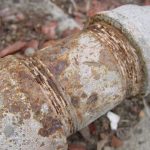Nothing lasts forever and this is very true when it comes to home plumbing systems. Residential pipes are designed to last for at least a few decades, but certain conditions and a lack of regular maintenance can lower the useful lifespan. Badly maintained pipes are more prone to leaks and breaks and water damage is expensive to fix. In this article, we will take a look at the various types of residential plumbing pipes and their projected lifespans.
Plumbing (Supply) Pipes and Drain Lines
There are two main types of pipes that make up the plumbing system, they are plumbing (supply) pipes and drain lines. They each perform different tasks, let’s take a look at them in more detail.
Supply Lines
These carry the clean water and gas into the home directing them to the fixtures and appliances. These pipes tend to be permanently installed underground and behind walls. There are three main supply line materials, they are copper, brass, and galvanized steel. The exact material used in the pipe construction will vary depending on the age of the home and connected fixtures. The supply lines are under consistent pressure to deliver the water and this increases the chance of a leak if the pipe wall is compromised. The supply lines tend to last from 20 up to 70 years, brass is considered to be the sturdiest material and galvanized steel is pretty weak.
Drain Lines
As the name suggests, the drain lines take the water and associated waste out of the home. Older homes may have cast iron drain pipes, but the modern materials are usually PVC or PEX plastic pipes. The newer pipes work very well and they have a much longer lifespan. Cast iron pipes last from 75 up to 100 years and plastic pipes could be considered to have a virtually indefinite lifespan under normal operating conditions.
What Causes Broken Pipes?
When you take a look at the lengthy expected lifespan terms noted above, it’s easy to assume that there is no need to worry about leaking or broken pipes. But, those are potential lifespans under ideal conditions and they don’t take various factors into account including shifting soil, earthquakes, poor installation, and additional stress. When one or more of these factors comes into play then can lower the lifespan significantly.
How Can I Prevent Pipe Repairs or a Replacement?
The best way to protect the integrity of your plumbing pipes and drain lines is to invest in regular maintenance. During these visits, the professional plumber can inspect the sewer line with a camera, carry out hydro-jetting to clear drain clogs, and evaluate the pipe conditions. Even though they are located underground the pipes are vulnerable to ground pressure, soil movement, tree root intrusions, and more. Early detection is key if you want to find and fix a problem quickly and these earlier repairs are usually less expensive.
If you want to schedule an inspection for your home plumbing system, contact your local certified plumber today.





